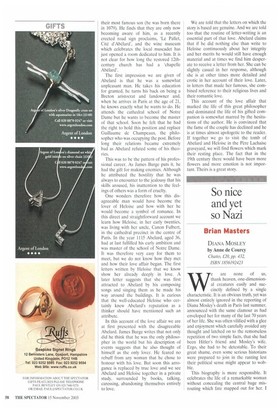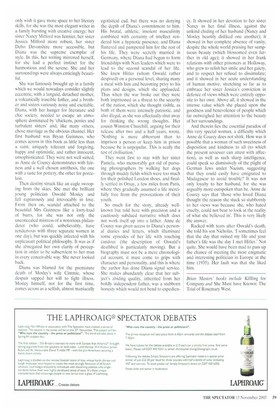So nice and yet so Nazi
Brian Masters
DIANA MOSLEY by Anne de Courcy Chatto,120, pp. 432, ISBN 1856192423 Ive are none of us, thank heaven, one-dimensional creatures easily and succinctly defined by a single characteristic. It is an obvious truth, yet was almost entirely ignored in the reporting of Diana Mosley's death in Paris last summer, announced with the same clamour as had enveloped her for many of the last 70 years of her life. She was often vilified with a glee and enjoyment which carefully avoided any thought and latched on to the remorseless repetition of two simple facts, that she had been Hitler's friend and Mosley's wife. Ergo, she had to be detestable, To their great shame, even some serious historians were prepared to join in the ranting lest their political sense might appear to wobble.
This biography is more responsible. It celebrates the life of a remarkable woman without concealing the central huge misrouting which fate mapped out for her. I only wish it gave more space to her literary skills, for she was the most elegant writer in a family bursting with creative energy; her sister Nancy Mitford was funnier, her sister Jessica Mitford more robust, her sister Debo Devonshire more accessible, hut Diana was the supreme exemplar of style. In this, her writing mirrored herself, for she had a perfect instinct for the harmonious and the serene. She and her surroundings were always enticingly beautiful.
She was famously brought up in a family which we would nowadays consider slightly eccentric, with a languid, detached mother, a volcanically irascible father, and a brother and sisters variously noisy and excitable. Diana, with her hunger for literature and chic society, needed to escape an atmosphere dominated by 'chickens, ponies and turbulent sisters' and, like many others, chose marriage as the obvious channel. Her first husband was Bryan Guinness, who comes across in this book as little less than a saint, uniquely tolerant and forgiving, happy and optimistic, and rather innocent, unsophisticated. They were not well suited, as Anne de Courcy demonstrates with fairness and a well chosen antithesis, the one with a taste for pottery, the other for porcelain.
Then destiny struck like an eagle swooping from the skies. She met the brilliant young politician Oswald Mosley and fell rapturously and irrevocably in love. From then on, scandal attached to the beautiful Mrs Guinness like a lorry-load of burrs, for she was not only the unconcealed mistress of a notorious philanderer (who could, unbelievably, have rendezvous with three separate women in one day), but was quickly infected with his unpleasant political philosophy. It was as if she abnegated her own clarity of perception in order to be subservient to her man in every conceivable way. She never looked back.
Diana was blamed for the premature death of Mosley's wife Ciminie, whose despair sapped her will to fight illness. Mosley himself, not for the first time, comes across as a selfish, almost maniacally egotistical cad, but there was no denying the depth of Diana's commitment to him. His brutal, athletic, insolent masculinity combined with certainty of intellect rendered him a hypnotic presence, and Diana flattered and pampered him for the rest of his life. They were secretly married in Germany, where Diana had begun to form friendships with Nazi leaders which were to lead to the second scandal of her life. She knew Hitler (whom Oswald rather despised) on a personal level, sharing many a meal with him and becoming privy to his plans and designs, which she applauded. Thus when the war broke out they were both imprisoned as a threat to the security of the nation, which she thought risible, as both of them were intensely patriotic, and also illegal, as she was effectually shut away for thinking the wrong thoughts. Her cousin Winston Churchill, arguing for their release after two and a half years, wrote, 'Nothing is more abhorrent than to imprison a person or keep him in prison because he is unpopular. This is really the test of civilisation.'
They went first to stay with her sister Pamela, who memorably got rid of pursuing photographers by walking her dogs through muddy fields which were too much for their polished London shoes, and finally settled in Orsay, a few miles from Paris, where they gradually assumed a life mercifully free from the provocations of their youth.
So much for the story, already wellknown but told here with precision and a cautiously subdued narrative which does not work itself up into a lather. Anne de Courcy was given access to Diana's personal diaries and letters, which illuminate some episodes of her life with touching candour (the description of Oswald's deathbed is particularly moving). But a biography must not be a mere chronological account, it must come to grips with character and personality, and this is where the author has done Diana signal service. She makes abundantly clear that her subject's abiding quality, inherited from her boldly independent father, was a stubborn honesty which would not bend to expedien cy. It showed in her devotion to her sister Nancy in her final illness, against the unkind chiding of her husband (Nancy and Mosley heartily disliked one another); it showed in her complete absence of vanity, despite the whole world praising her sumptuous beauty (which blossomed even further in old age); it showed in her frank relations with other prisoners at Holloway, who grew to relish her smile and her gaiety, and to respect her refusal to dissimulate; and it showed in her acute understanding of human motive, stretching so far as to embrace her sister Jessica's conviction in defence of views which were entirely opposite to her own. Above all, it showed in the intense value which she placed upon the goodness and benevolence of people which far outweighed her attention to the beauty of her surroundings.
And therein lies the essential paradox of this very special woman, a difficulty which Anne de Courcy does not shirk. How was it possible that a woman of such sweetness of disposition and kindness to all (to which the present reviewer can attest with affection), as well as such sharp intelligence, could speak so dismissively of the plight of German Jews under Nazism, suggesting that they could easily have emigrated to Madagascar to avoid trouble? It was not only loyalty to her husband, for she was arguably more outspoken than he. Anne de Courcy says that 'those who loved Diana thought the reason she stuck so stubbornly to her views was because she, who hated cruelty, could not bear to look at the reality of what she believed in'. This is very likely the answer.
Racked with tears after Oswald's death, she told his son Nicholas, 'I sometimes feel that the day that ruined my life and your father's life was the day I met Hitler.' Not quite. She would have been mad to pass up the chance of meeting the most enigmatic and interesting politician in Europe at the time (1935). Her fault was that she liked him.
Brian Masters' books include KiIlling for Company and She Must have Known: The Trial of Rosemary West



























































































 Previous page
Previous page